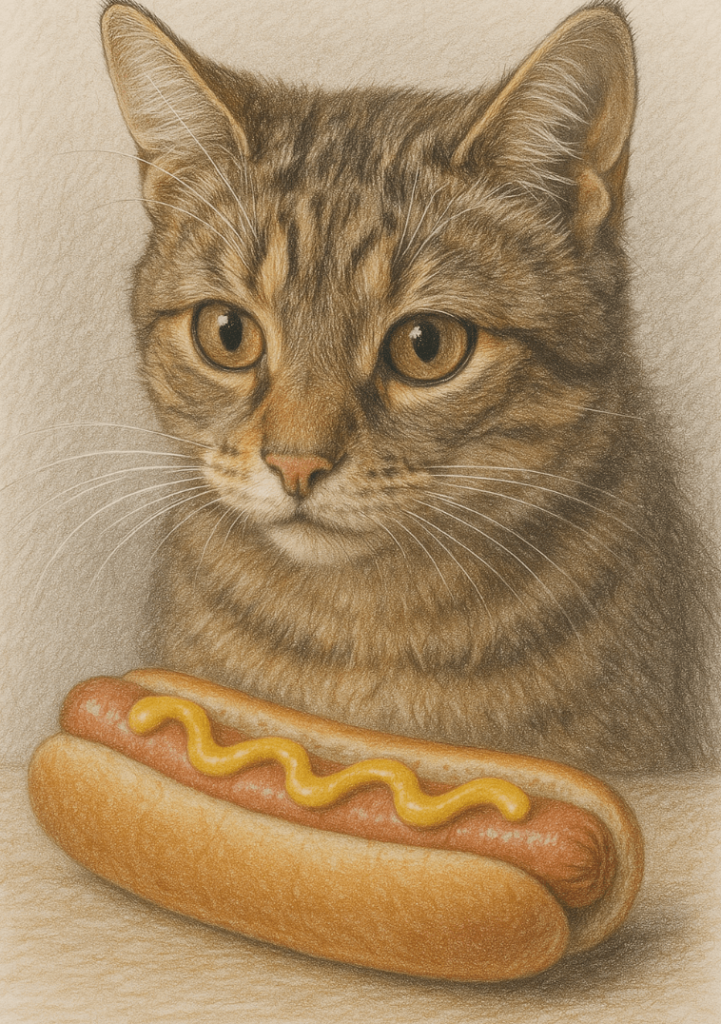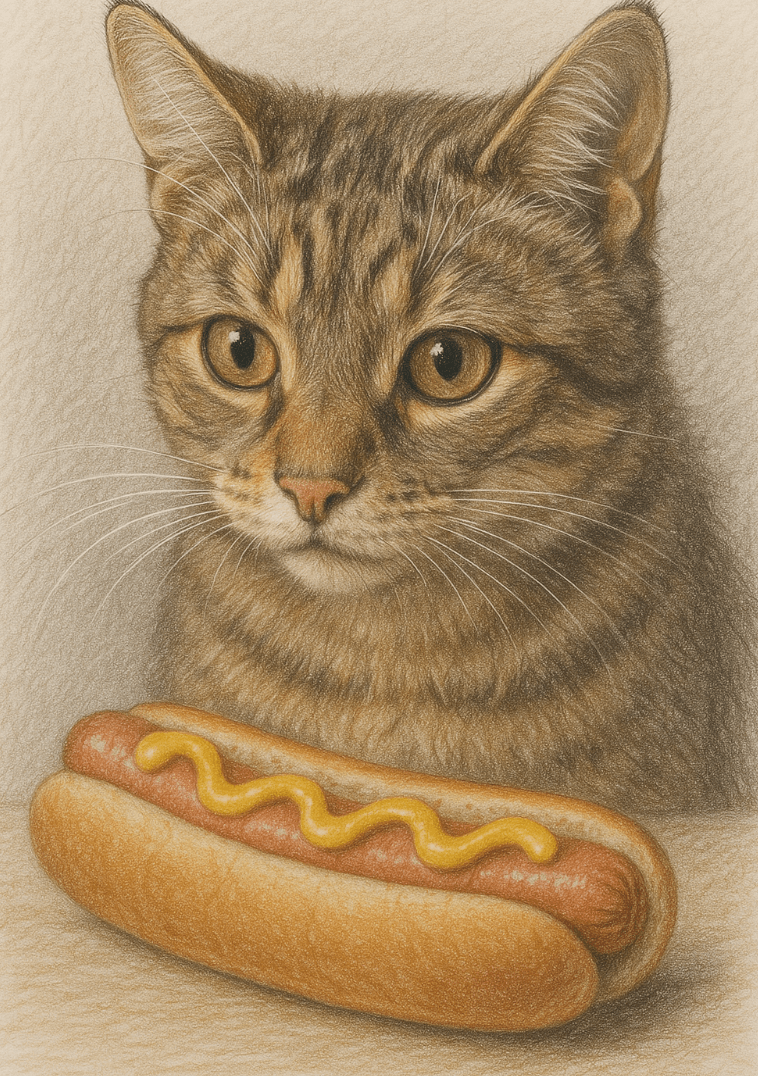Can Cats Eat Hot Dogs?
Hot dogs are a popular snack for humans, often enjoyed at barbecues, sporting events, or casual meals. But what about our feline friends? Can cats eat hot dogs, or should this processed food be strictly off-limits? As obligate carnivores, cats have unique dietary needs that differ significantly from ours. While the occasional nibble might not cause immediate harm, it’s essential to understand the potential risks and benefits before sharing your food with your furry companion. In this blog post, we’ll explore whether cats can safely eat hot dogs, what ingredients to watch out for, and healthier alternatives to keep your cat happy and healthy.
Potential Risks of Feeding Hot Dogs to Cats
While hot dogs may seem like a harmless treat, they contain several ingredients and characteristics that can pose risks to your cat’s health. Understanding these dangers is crucial before offering any human food to your pet.
High Sodium Content:
Hot dogs are packed with salt, which can lead to dehydration, kidney issues, or even sodium ion poisoning in cats.Artificial Additives:
Preservatives, flavorings, and colorings in hot dogs can upset your cat’s digestive system or cause allergic reactions.Processed Meats Are Hard to Digest:
Cats’ digestive systems are not designed to process heavily processed foods, which can lead to gastrointestinal distress.Risk of Choking or Blockages:
Large chunks of hot dog or casing material can pose choking hazards or cause intestinal blockages if swallowed whole.Potential for Obesity:
Hot dogs are calorie-dense and lack the nutrients cats need, contributing to weight gain if fed regularly.
These risks highlight why hot dogs are not an ideal food choice for cats and should be given sparingly, if at all.
Ingredients in Hot Dogs That Are Harmful to Cats
The ingredients commonly found in hot dogs can be problematic for cats, especially when consumed in large quantities. Here’s a breakdown of what to avoid and why.
Nitrates and Nitrites:
These preservatives, used to extend shelf life, can be toxic to cats and may increase the risk of cancer over time.Onions and Garlic Powder:
Even small amounts of onion or garlic powder, often included in hot dog seasoning, can damage a cat’s red blood cells and lead to anemia.Excessive Fat Content:
The high fat in hot dogs can upset your cat’s stomach and contribute to pancreatitis, a painful inflammatory condition.Spices and Seasonings:
Many seasonings, such as paprika or mustard seeds, can irritate your cat’s digestive tract or cause adverse reactions.Breaded or Fried Varieties:
Coated or fried hot dogs add unnecessary calories and unhealthy fats, further compromising your cat’s diet.
Being aware of these harmful ingredients ensures you make safer choices for your cat’s diet.
Check this guide 👉Can Cats Eat Croissants? Best 7 Expert Tips!
Check this guide 👉Can Cats Eat Lizards? Best 7 Expert Tips!
Check this guide 👉Can Cats Eat Seaweed? Best 7 Expert Tips!

Safe Treat Alternatives for Cats | Risks of Unsafe Human Foods |
|---|---|
Plain cooked chicken (unseasoned) | Hot dogs with high sodium and additives |
Small pieces of boiled fish | Processed meats with nitrates/nitrites |
Cat-safe vegetables (e.g., carrots) | Foods containing onions or garlic |
High-quality commercial cat treats | Spicy or seasoned snacks |
Bone broth (unsalted and strained) | Fried or breaded items |
How to Safely Introduce Hot Dogs to Your Cat (If You Must)
If you’re determined to let your cat try a bite of hot dog, there are ways to minimize risks. Follow these guidelines to ensure their safety.
Choose Plain, Unseasoned Hot Dogs:
Opt for hot dogs without added spices, preservatives, or flavorings to reduce potential harm.Limit Portion Sizes:
Offer only a tiny piece—no larger than a thumbnail—to prevent overeating or digestive upset.Remove the Casing:
The outer casing can be difficult to chew and may cause choking or blockages; remove it entirely.Monitor for Reactions:
Watch your cat closely after feeding them a small piece to check for signs of allergies or discomfort.Make It a Rare Occasion:
Treat hot dogs as an extremely rare indulgence rather than a regular part of their diet.
By taking these precautions, you can reduce the likelihood of adverse effects while still satisfying your cat’s curiosity.
Signs Your Cat May Be Struggling After Eating Hot Dogs
Even with careful preparation, complications can arise if your cat consumes hot dogs improperly. Watch for these warning signs to act quickly if something goes wrong.
Vomiting or Diarrhea:
These symptoms indicate that your cat’s digestive system is struggling to process the food.Lethargy or Weakness:
A sudden lack of energy could signal dehydration or other health issues caused by excessive sodium intake.Difficulty Breathing:
Choking or inhaling small pieces of hot dog can lead to respiratory distress.Swollen Face or Paws:
Swelling may indicate an allergic reaction to one of the ingredients in the hot dog.Loss of Appetite:
If your cat refuses to eat after trying a hot dog, it could mean they’re experiencing nausea or discomfort.
Recognizing these signs early allows you to seek veterinary care promptly, preventing further complications.
Common Mistakes to Avoid When Feeding Human Food to Cats
Feeding human food to cats requires caution to avoid mistakes that could endanger their health. Here are some pitfalls to watch out for.
Assuming All “Meat” Products Are Safe:
Processed meats like hot dogs lack the nutritional value cats need and often contain harmful additives.Ignoring Portion Control:
Even small amounts of certain foods can upset your cat’s delicate digestive system.Forgetting About Seasonings:
Ingredients like salt, garlic, or spices can have serious consequences for cats.Overlooking Choking Hazards:
Large or tough pieces of food can pose risks, especially for smaller cats.Making It a Habit:
Regularly feeding human food can disrupt your cat’s balanced diet and lead to long-term health issues.
Avoiding these mistakes ensures a safer and healthier experience for your cat.
Healthier Alternatives to Hot Dogs for Cats
If you want to treat your cat without resorting to processed foods like hot dogs, there are plenty of nutritious and safe alternatives available.
Cooked Chicken or Turkey:
Plain, unseasoned poultry is an excellent source of protein for cats.Boiled Fish (No Bones):
Fish like salmon or tuna, cooked without oil or seasoning, provides omega-3 fatty acids that support skin and coat health.Steamed Vegetables:
Carrots, green beans, or pumpkin can offer vitamins and fiber when served in moderation.Cat-Safe Commercial Treats:
Specially formulated treats ensure your cat gets the nutrients they need without risking their health.Homemade Cat Treat Recipes:
Simple recipes using ingredients like chicken, liver, or oats can be both tasty and nutritious for your cat.
These alternatives allow you to cater to your cat’s instincts while keeping them safe.
Understanding Your Cat’s Natural Diet Preferences
Cats are obligate carnivores, meaning their bodies are designed to thrive on a meat-based diet. Understanding their natural preferences helps explain why certain foods, like hot dogs, aren’t ideal for them.
High Protein Needs:
Cats require diets rich in animal-based proteins, which hot dogs fail to provide adequately.Limited Ability to Process Carbs:
Unlike humans, cats derive little energy from carbohydrates, making starchy foods like buns unsuitable.Essential Nutrients Only Found in Meat:
Taurine, arachidonic acid, and vitamin A are vital nutrients that cats cannot synthesize themselves and must obtain from meat.Natural Instincts Drive Food Choices:
In the wild, cats hunt small prey, consuming nearly the entire animal for balanced nutrition.Sensitivity to Artificial Ingredients:
Cats lack the enzymes needed to break down many artificial additives, making processed foods particularly risky.
By recognizing these dietary needs, you can better align your cat’s meals with their biological requirements.
Frequently Asked Questions About Cats and Hot Dogs
Are plain hot dogs safe for cats?
While plain hot dogs are less harmful than seasoned ones, they’re still high in sodium and fat, making them unsuitable for regular consumption.
Can kittens eat hot dogs?
Kittens have sensitive digestive systems and should never eat hot dogs, as they’re more prone to illness from inappropriate foods.
What should I do if my cat ate a whole hot dog?
Contact your veterinarian immediately, as large portions can cause choking, blockages, or sodium poisoning.
Are vegetarian hot dogs safe for cats?
Vegetarian hot dogs lack the protein cats need and often contain artificial additives, making them unsuitable for feline diets.
What are better alternatives to hot dogs for cats?
Cooked chicken, plain fish, or specially formulated cat treats are healthier and safer options for your pet.
Prioritizing Your Cat’s Health Over Curiosity
While it’s tempting to share a bite of your favorite snack with your cat, hot dogs simply don’t provide the nutrition they need and come with significant risks. By understanding the potential dangers and opting for safer alternatives, you can ensure your cat stays healthy and happy. Remember, your feline friend relies on you to make the best dietary choices for them—so always prioritize their well-being above all else. With a little creativity and care, you can find plenty of ways to spoil your cat without compromising their health.
Do Cats Have Taste Buds? Best 7 Expert Tips! – Discover how cats experience flavors and why their taste is so unique.
Do Dogs Have Taste Buds? Best 7 Expert Tips! – Discover how dogs experience taste, their preferences, and what it means for their diet and health.
Can Cats Taste Sweet? Best 7 Expert Tips! – Discover why cats can’t taste sweetness, how it affects their diet, and tips to keep them healthy and happy.
Can Dogs Taste Sweet? Best 7 Expert Tips! – Discover how dogs perceive sweetness, which foods are safe, and tips to manage their sweet cravings responsibly.





